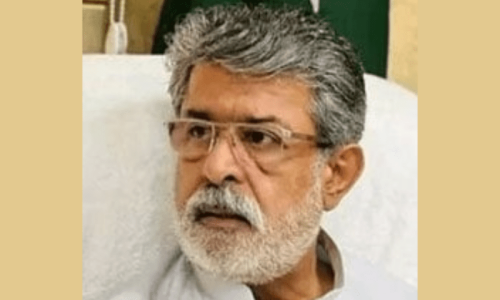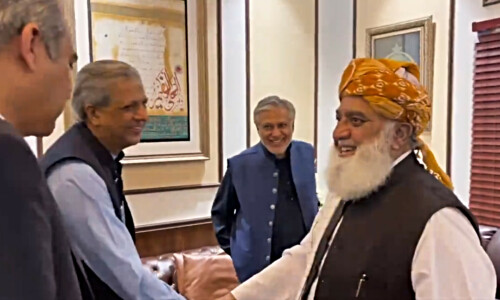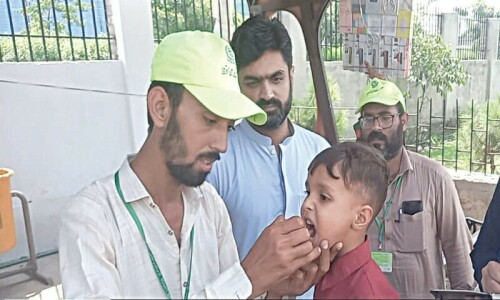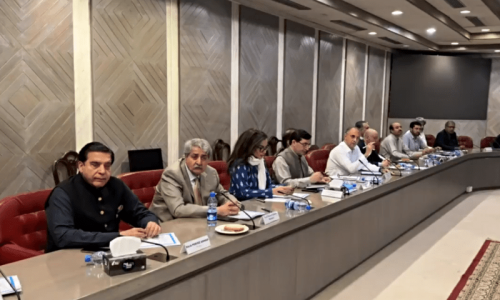ISLAMABAD: Senator Sherry Rehman on Monday emphasised the need for international collaboration to address the issue of climate change which, according to her, is a problem with widespread impacts on how countries interact.
She urged Pakistan to creatively explore alternative solutions, especially through climate finance and sustainable development, while reinforcing ties with both the US and China.
“Our regional security environment may impact our ties with immediate neighbours but Pakistan can seek other economic partners if we enhance our governance on energy and infrastructure, environment and social sectors,” she said.
“There are clear gains in the renewable sector which will unlock cheaper and cleaner energy because no country can be wealthy without assured energy supplies. Our encounter with the global commodity market on importing energy has not been the best experience, so we should shift gears towards the kind of energy that is not priced at high international commodity rates but priced locally and treated as a sustainable technology.”
In contrast, she warned that the world is seeing the weaponisation of both technology and resources like water, signalling a failure of multilateralism.
She was speaking at the ‘National Strategy Lab’s’ inaugural session hosted by the Friedrich Ebert Stiftung (FES).
About new geopolitics of Asia, she outlined the challenges and strategic imperatives for Pakistan in a rapidly evolving global context.
Senator Rehman acknowledged Pakistan’s deep vulnerabilities, pointing out that it is the fifth most vulnerable country to climate change despite contributing less than 1pc to global emissions. Quoting a World Bank study, she stressed the need for unlocking climate finance, particularly given Pakistan’s estimated need of $348 billion for a comprehensive response to climate and development challenges by 2030. This consists of $152b for adaptation and resilience and $196bn for deep de-carbonisation.
With water scarcity looming and Pakistan predicted to be water-scarce by 2025, Senator Rehman called for urgent attention to shared river basins between India and Pakistan, and the high risks posed by glacial melt and extreme weather events.
“These environmental crises require collaborative management and sustainable solutions like Pakistan’s pioneering Delta Blue Project, the world’s largest reclamation initiative aimed at restoring mangroves as natural disaster buffers. It is able to monetise carbon sinks while adding green jobs and restoring wetlands.”
She said: “The ground is shifting below our feet as we witness mega trends that are reshaping the world. It is crucial for every entity to budget and plan for competing scenarios while keeping in mind the meta trends driving these changes, particularly climate change.”
She noted that while globalisation once promised shared surpluses in trade and technology, today’s fractured world brings greater risks.
“Geopolitical rivalries are pushing the world towards unpredictability.”
Referring to ongoing conflicts, she stated, “We haven’t seen this many conflicts since 1945, and the consequences will shape everything from energy pricing to global trade.”
She said while many economies, such as the ASEAN bloc, offers a beacon of hope, South Asia remains buckled under its own challenges with Pakistan needing to pivot and adapt within this fast-changing international order.
About Pakistan’s specific challenges, she highlighted the urgent need for better governance and strategic planning to leverage regional opportunities like the China-Pakistan Economic Corridor (CPEC). She said that while China had invested $297 billion in energy sector in Pakistan and SEZs can create over 600,000 jobs, the country still struggles with governance issues in energy distribution and grid management.
She drew attention to Pakistan’s energy transition, highlighting the country’s rise as the third-largest importer of Chinese solar panels.
“Pakistan is going through a solar rooftop revolution, and by 2030, 60pc of our energy should be from renewable energy sources, according to our NDCs,” she noted.
Published in Dawn, September 10th, 2024












































Dear visitor, the comments section is undergoing an overhaul and will return soon.